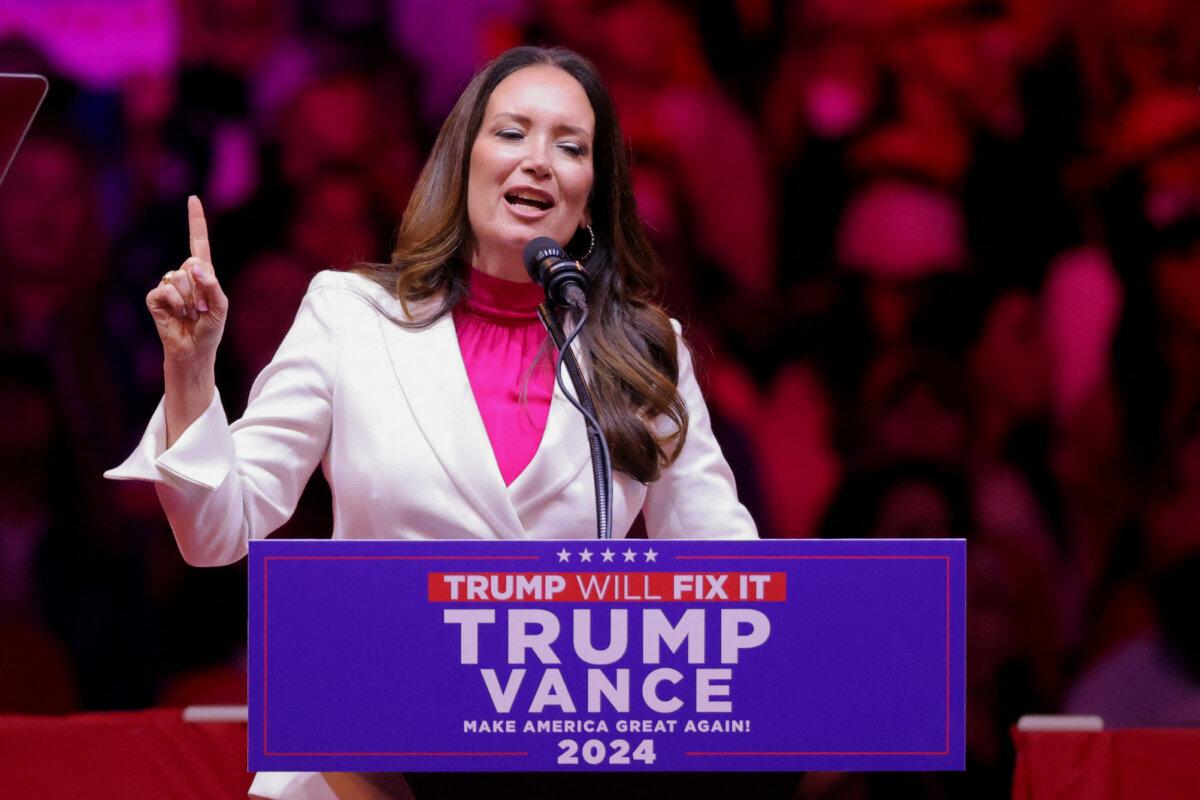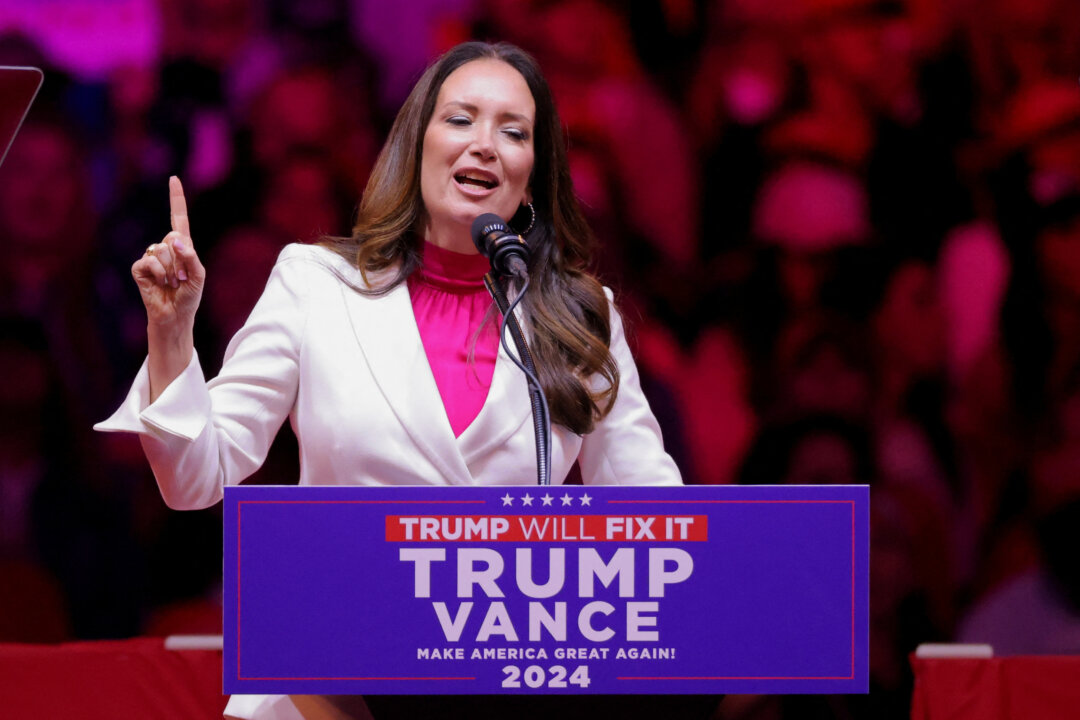Behind-the-scenes Texas ‘ag girl’ gets prime time role in leading 100,000-employee USDA with a trillion dollar budget on tap.
President-elect Donald Trump on Nov. 23 nominated conservative Texas attorney Brooke Rollins to be his administration’s secretary of agriculture.
Rollins, 52, was raised by a single mother in Glen Rose, a farming town of 1,200 about 50 miles southwest of Fort Worth, and has an undergraduate degree in agricultural development from Texas A&M University. She and her husband, Mark Rollins, and their four children are described as devout Texas A&M Aggie football fans, according to her biography.
Below are five things to know about Rollins, who will lead the 100,000-employee U.S. Department of Agriculture (USDA), which spans 29 agencies, has a pending 125-page $213.3 billion budget, and is responsible for managing national forests, agricultural lending programs, food safety inspections, rural development, commodity trade policies, fighting wildfires, setting standards for school meals and nutrition programs that assist low-income people, pregnant women, and young children.
Co-Founder of Trump Advisory Group
Rollins co-founded America First Policy Institute (AFPI) with Trump National Economic Council chair Larry Kudlow in 2021. Former Trump Small Business Administration chief and America First Action PAC chair Linda McMahon signed as AFPI board chair, as did eight former Trump cabinet secretaries.
Although not directly affiliated with the former president or his 2024 reelection campaign, Rollins and the AFPI have significant influence on shaping Trump’s policy development and will continue to be prominent voices in his second administration.
The AFPI advocates an “America First Agenda” that calls for resuming construction of the Keystone Pipeline, ending federal funding for Planned Parenthood, and repealing red flag laws that restrict gun ownership.
Its platform espouses “job creation and low unemployment, expansion of affordable housing, reducing federal bureaucracy, cracking down on crime, passing congressional term limits, and ending foreign war and reliance on China.”
Although not formally part of the Trump transition team, The AFPI has its own transition project that includes nearly 300 prospective executive orders ready for Trump to sign immediately after his Jan. 20 inauguration.
The AFPI has been described as a rival to the better-known The Heritage Foundation in terms of access to the president. Its America First Agenda appears to be the president-elect’s preferred policy toolbox over The Heritage Foundation’s Project 2025 transition project.
Trump is, indeed, tapping the AFPI for administration posts. Others from the institute nominated for key roles are McMahon as secretary of Education, AFPI security center chief and former Trump national security adviser John Ratcliffe as CIA director, and AFPI legal center chair Pam Bondi as attorney general.
Served in Trump’s White House
Rollins, among speakers at July’s Republican National Convention, is widely regarded as a low-key but influential Republican operative praised for her managerial competence and loyalty to the former president.
A member of the 2016 Trump campaign’s Economic Policy Council, Rollins joined Trump’s White House in 2018 as an assistant to the president and then as director of the Office of American Innovation, where she worked on initiatives with Trump’s son-in-law, Jared Kushner, before becoming acting director of the Trump’s Domestic Policy Council in 2020.
She is perhaps best known for aligning with Kushner in supporting criminal justice reform, resulting in the adoption of the First Step Act, which revised sentencing and prison laws.
Following its adoption, Rollins told Fox News in an April 2019 interview that the First Step Act is “a transformational effort to change our criminal justice system at the federal level, following what many of the red states around the country have been doing for about a decade, including my Texas.”
She was among the leading candidates to serve as Trump’s chief of Staff. Susie Wiles was eventually chosen for the position.
Trump has repeatedly praised Rollins’s contributions, including in his Nov. 23 statement announcing her nomination as secretary of Agriculture.
“Brooke was on my 2016 Economic Advisory Council, and did an incredible job during my First Term as the Director of the Domestic Policy Council, Director of the Office of American Innovation, and Assistant to the President for Strategic Initiatives,” he wrote on Truth Social.

Longtime Lone Star Operator
After graduating from Texas A&M with a Bachelor of Science in agricultural development in 1994, Rollins earned a law degree from the University of Texas and clerked for a Northern District of Texas federal justice before working as a litigation attorney in Dallas.
According to a biography, in 2003, she joined the Texas Public Policy Foundation (TPP), a conservative think tank affiliated with Gov. Rick Perry, as its president and chief executive, leading it for 15 years. She was also an aide to Perry, who would serve as energy secretary during Trump’s first administration.
At the TPP, she wrote opinion columns that were widely published across Texas, urging the state to resist federal overreach, expressing support for school choice, and advocating energy deregulation.
Rollins was named one of the state’s most powerful 25 people by Texas Monthly in 2011. The TPP was labeled the “most influential” policy group in the Lone Star State by the Texas Observer in 2014.
During her 15 years at the TPP, Rollins grew the policy shop from six staffers based in San Antonio to nearly 100 employees in a new Austin headquarters two blocks from the Texas State Capitol with an eight-figure budget funded by donations from the Koch brothers, ExxonMobil, and dozens of corporations, interest groups, conservative organizations, and wealthy GOP donors.
The TPP has been key in launching and supporting the careers of Perry, Sen. Ted Cruz (R-Texas), and Gov. Greg Abbott, among other GOP leaders.
Personal Life
Rollins exposes little of her personal life to media scrutiny. An October 2022 profile in Maroon, a magazine for Texas A&M alumni, repeats what her biography succinctly states.
Rollins “and her husband, Mark ’94, currently reside in Fort Worth, Texas, and spend a majority of their free time taxiing their four children to baseball games, cattle shows, piano lessons, and Aggie football games.”
In announcing Rollins as his secretary of Agriculture, Trump cited her “upbringing in the small and agriculture-centered town of Glen Rose, Texas, to her years of leadership involvement with Future Farmers of America and 4H, to her generational family farming background, to guiding her four kids in their show cattle careers.”
“This is big stuff for a small-town ag girl from Glen Rose, TX—truly the American Dream at its greatest,” Rollins said in a Nov. 23 post on social media platform X.
In interviews over the years, Rollins has framed herself as an “ag girl” from a farm town more than a member of a farm family.
Raised by a single mother, Rollins worked in the family flower shop, which taught her “anyone can be a success if they work hard, dream big, and do everything with great integrity,” she told the Georgia Public Policy Foundation in 2012.
In a 2012 Independent Women’s Forum Modern Feminist profile, Rollins said her “commitment to conservative principles began when she was eight years old, watching, transfixed, as Ronald Reagan took the oath of office in 1980.”
At Texas A&M University, she was elected as the first woman to serve as associated student government president in the then 115-year-old school’s history.
“The biggest lesson I learned as student body president was to always find a way to serve others,” Rollins told Maroon nearly three decades later. “Think big about how you can do that, but always stay rooted in your values. The method of how we serve others changes frequently, but why we serve should remain steadfast.”
Rollins served as campaign manager for her mother, Helen Kerwin, a former mayor of Glen Rose and the first Republican Somervell County Commissioner who, at 77 years old, was elected to serve in the Texas House of Representatives in November.
What’s Ahead
The biggest issue facing the new secretary of Agriculture is getting the five-year Farm Bill adopted. A massive omnibus that sets agriculture, conservation, and nutrition policies, the current five-year Farm Bill that Trump signed in 2018 was extended a year in November 2023. That extension will soon expire.
Farms bills authorize only mandatory funding based on multiyear estimates as baselines for annual allocations. Discretionary spending, about $25 billion a year, is not included in farm bills, which over the entire span allocate up to $1 trillion.
Among policy issues she will tackle on behalf of the incoming administration is how to manage or derail the implementation of more than $20 billion in dedicated allocations for conservation and climate programs adopted under 2022’s Inflation Reduction Act, a key bill in the Biden administration’s clean energy initiative.
In addition, the USDA and the Department of Health and Human Services (HHS) face a late 2025 deadline to finalize the 2025–30 edition of the Dietary Guidelines for Americans, where Rollins is expected to work with Robert F. Kennedy Jr., Trump’s nominee to lead the HHS.
Kennedy has espoused support for yet vague wholesale revisions to the HHS and the dietary guide. He has pledged to remove ultra-processed foods from school lunches and to prohibit soda, candy, or other “junk foods” from being eligible for purchase using food stamps under the USDA’s Supplemental Nutrition Assistance Program.

